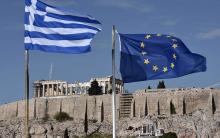Economic history
Current economic trends
Data on electricity consumption, traffic of electronically tolled vehicles, registered unemployment, business tendency and other charts
- Read more about Current economic trends
- Log in to post comments
Private sector bank deposits rise for 10th month in November
Greek private sector bank deposits rose in November for the tenth month in a row, central bank data showed on Tuesday.
Business and household deposits increased to 158.7 billion euros ($194.93 billion) from 155.7 billion in October, Bank of Greece data showed.
Forty-five billion euros from EU fund could raise Greece to next level
The next five years could prove pivotal for the Greek economy as the government seeks via its National Recovery and Sustainability Plan to utilize resources from the European Union's Recovery Fund amounting to 32 billion euros - which could reach €45 billion together with private funds - and power the country's GDP to a new level.
Macroeconomic Confidence Indicator decreases in October by 2.3 points
The Macroeconomic Confidence Indicator of the CFA Romania Association decreased in October compared to the previous month by 2.3 points, to the value of 32.1 points, according to a release sent to AGERPRES on Monday. Compared to the same month of the previous year, the indicator decreased by 22.4 points, according to CFA Romania.
OPEC, allies agree to lower oil production by 10 mln bpd
OPEC and its allies agreed early on April 10 to lower their collective crude oil production by 10 million barrels per day (bpd) until the end of the second quarter of 2020.
Saudi Arabia-led OPEC and Russia-led non-OPEC oil-producing nations started their 9th (Extraordinary) OPEC and non-OPEC ministerial meeting via webinar on April 9 at 1445GMT.
House prices show marked slowdown
The Greek housing market has doubtlessly slowed down this year, with the sale price growth rate declining for six consecutive months. Based on data from the first quarter of 2020, the slowdown marks are clear, as most areas observed a lower pace of price growth compared to the fourth quarter of last year.
- Read more about House prices show marked slowdown
- Log in to post comments
Greek current account deficit widens in January
Greece's current account deficit widened in January compared with the same month a year earlier, the Bank of Greece said on Friday.
Central bank data showed the deficit was 1.29 billion euros ($1.39 billion) from a deficit of 1.18 billion euros in January 2019.
[Reuters]
- Read more about Greek current account deficit widens in January
- Log in to post comments
Oil Prices in the World have Fallen by over 30%
Oil prices on Monday start with a collapse of 35 - 40% after the OPEC + meeting, which ended last Friday with Russia's exit from the oil restriction deal, according to trade data.
The signals came on Friday, with more hopes of finding a way out then.
- Read more about Oil Prices in the World have Fallen by over 30%
- Log in to post comments
Property prices pick up pace
House prices last year rose at the highest rate recorded since 2006, according to Bank of Greece data released on Wednesday, in a clear indication of the recovery of both the market and the economy in general.
- Read more about Property prices pick up pace
- Log in to post comments
Greek current account deficit shrinks in December
Greece's current account deficit shrank in December 2019 compared with the same month a year earlier, the Bank of Greece said on Thursday.
Central bank data showed the deficit was 0.54 billion euros ($582.98 million), down from 1.514 billion euros in December 2018. Tourism revenues increased to 289 million euros from 272 million in the same month in 2018.
- Read more about Greek current account deficit shrinks in December
- Log in to post comments









